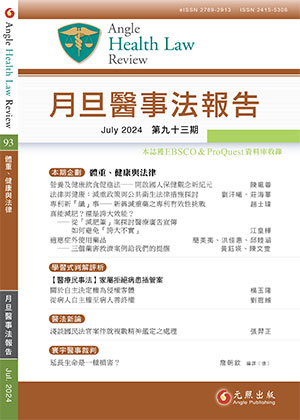【醫療民事法】家屬拒絕病患插管案:從病人自主權至病人善終權【學習式判解評析】 試閱
Intubation Refusal by Patients' Family: From Autonomy of Patient to Patient's Right to Euthanasia
我國實務、學理普遍承認「病人自主權」,惟就病人得否本於自身意願選擇走向死亡方式之「病人善終權」,因傳統文化及生命權優位之強調,多有爭論。本文認自人性尊嚴原則、病人自主權出發,得正面肯認「病人善終權」概念,然適用上應遵守法律保留原則,由立法機關進行明文規範。本件雖係醫療處置是否符合醫療常規之糾紛,惟法院認符合法律程序要件時,病人(法定代理人)依「病人自主權」,得選擇拒絕侵入性插管治療,據此所為醫療處置並無責任,實質上展現對「病人善終權」之尊重。
The autonomy of patients is generally recognized in practice and theory. However, there are many controversies on whether patients have the right of euthanasia, according to which they could choose the way of death of their own will, due to the traditional culture and emphasis on the priority of the tight of life. This essay recognizes that the right to euthanasia can be positively recognized in the light of the principle of human dignity and the right to autonomy, but its application should be subject to the principle of legal reservation and should be expressly regulated by the legislature. Although the case at hand is a dispute on whether the medical treatment is in accordance with medical practice, the court held that if the legal procedure is followed, the patient (and his legal representative) can choose to refuse the invasive intubation treatment in accordance with the right to autonomy, and accordingly there is no responsibility for the medical treatment, which is a substantial demonstration of respect for the patient’s right to euthanasia.
081-103






